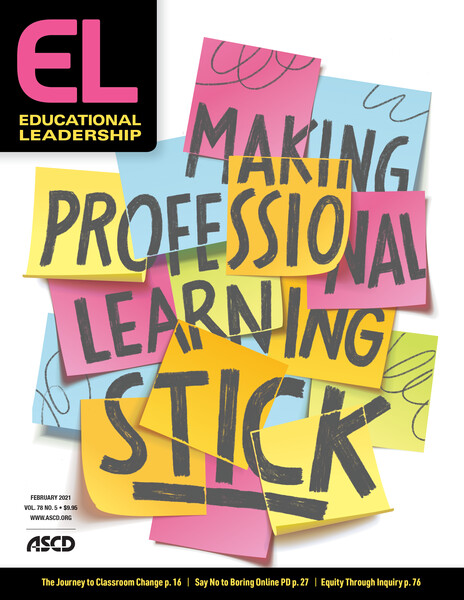ASCD Virtual Events
ASCD Symposium: Equity in Action Feb 24 – $49
ASCD 40th Annual Pre-K and Kindergarten Conference March 4–5 – $149
ASCD Symposium: The Empowered Principal April 21 – $49
ASCD 2021 Annual Conference: June 25–27 – $149
2021 ASCD General Membership Board Election
Voting opens April 1 for the 2021 ASCD general membership board election.
Voting opens April 1 to fill two positions on ASCD's 2021–2022 Board of Directors. The candidates are:
Kim Kross, Chief Operating Officer, Elevate K-12, Chicago, Illinois
Jeremy S. Owoh, Deputy Superintendent for Academics and School Leadership/Chief Academic Officer, Little Rock School District, Little Rock, Arkansas
Noris Price, Superintendent, Baldwin County School District, Milledgeville, Georgia
Steven Weber, Associate Superintendent for Teaching and Learning, Fayetteville Public Schools, Fayetteville, Arkansas
Starting April 1, cast your vote by logging in with your member ID and password at www.ascd.org/vote. The election closes on May 15, 2021. Please contact ASCD Governance at governance@ascd.org with any questions.
Attention ASCD Members
In the association's General Election (April 1 – May 15, 2021), ASCD members will be asked to vote on a proposed Constitution and Bylaw change. Information about the proposed change can be found on ASCD's Governance home page located at www.ascd.org/governance.
Coming up in EL in March 2021: Equity in Action
There's a great deal of talk about the need for greater equity in schools—but how do educators make this happen? The March 2021 issue of Educational Leadership will go beyond the buzz and explore practical strategies for dismantling biases, closing opportunity gaps, and creating conditions where all students can thrive. Find out how to put equity at the heart of school culture and decision-making. Featured authors include Sarah Fiarman, Chaunté Garrett, Tyrone C. Howard, and Dena Simmons.
Resources to Make PD Stick
Professional Development That Sticks: How Do I Create Meaningful Learning Experiences for Educators? by Fred Ende. (ASCD, 2016). Stock no. SF116040.
Searching for ways to motivate and inspire your teachers through professional development experiences that are relevant, meaningful, and lasting? Look no further than this short-form practical guide. Ende's three-stage professional development for learning (PDL) process covers critical aspects of planning, providing, and following up.
The Instructional Playbook: The Missing Link for Translating Research into Practice by Jim Knight et al. (ASCD, 2020). Stock no. 122020.
Coaches have enormous potential to help teachers learn and implement new teaching practices, but coaches will be effective only if they deeply understand the strategies they describe and their explanations are clear. Knight and coauthors offer a simple and clear explanation of how to create a playbook uniquely designed to meet teachers' instructional needs.
The eCoaching Continuum for Educators: Using Technology to Enrich Professional Development and Improve Student Outcomes by Marcia Rock. (ASCD, 2019). Stock no. 117048.
This book integrates best coaching practices with an account of how school professionals can use today's technologies to ensure that students are engaged and learning.
Facilitating Teacher Teams and Authentic PLCs: The Human Side of Leading People, Protocols, and Practices by Daniel R. Venables. (ASCD, 2017). Stock no. 117004.
Taking a two-pronged approach to PLC facilitation, Venables offers targeted guidance both for leading the people in teacher teams and for facilitating their work.
C.R.A.F.T. Conversations for Teacher Growth: How to Build Bridges and Cultivate Expertise by Sally J. Zepeda, Lakesha Robinson Goff, and Stefanie W. Steele. (ASCD, 2019). Stock no. 120001.
Conversations between administrators and teachers take place every day, for many reasons, but what can we do to elevate them so that they lead to better professional relationships, more effective school leaders and teachers, and improved learning for students? C.R.A.F.T. Conversations for Teacher Growth offers the answer, demonstrating how exchanges that are clear, realistic, appropriate, flexible, and timely can be transformational.







